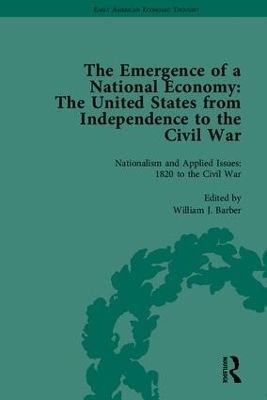
The Emergence of a National Economy
Pickering & Chatto (Publishers) Ltd
978-1-85196-750-6 (ISBN)
Warren J Samuels is at Michigan State University. His publications include The Classical Theory of Economic Policy (1966) Marianne Johnson is at the University of Wisconsin, Oshkosh William J Barber is at Wesleyan University, and his publications include A History of Economic Thought (1967) Malcolm Rutherford is at the University of Victoria. His publications include Institutions in Economics: the old and the new institutionalism (1994) Steven G Medema is at the University of Colorado, Denver and is author of Ronald H Coase (1994)
Volume 1: Organization of the National Economy General Introduction, From Independence to the Civil War; Note on Copy-Texts; Thomas Jefferson, 'The Present State of Manufactures, Commerce, Interior and Exterior Trade' (1785); Tench Coxe, An Enquiry into the Principles on Which a Commercial System for the United States of America Should be Founded (1787); Tench Coxe, An Address to the Assembly of Friends of American Manufactures (1787); Alexander Hamilton, Report on Manufactures (1791); Tench Coxe, Reflections on the State of the Union (1795); George Logan, An Address on the Natural and Social Order of the World, as Intended to Produce Universal Good (1798); George Logan, A Letter to the Citizens of Pennsylvania on the Necessity of Promoting Agriculture, Manufactures, and the Useful Arts (1800); Thomas Jefferson, Letter to Benjamin Austin ([1816] 1903) Volume 2: Creating a National System of Taxation John Jay, A Circular Letter from the Congress of the United States of America to Their Constituents (1779); Pelatiah Webster, A Sixth Essay on Free Trade and Finance (1783); Samuel Wales, The Dangers of Our National Prosperity (1785); Fisher Ames, Letter to George Richards Minot, ([1789] 1854); Excerpt of a Letter to George Richards Minot, ([1790] 1854); Letter to Christopher Gore, ([1797] 1854); 'Speech on Mr Madison's Resolutions' ([1794] 1854); all from The Works of Fisher Ames: With a Selection from His Speeches and Correspondence (1854); George Logan, Fourteen Experiments on Agriculture (1791); James Thomson Callender, A Short History of the Nature and Consequences of Excise Laws (1795); James Swan, National Arithmetick (1786); John Woolman, 'A Plea for the Poor' ([1793] 1922); Thomas Paine, Agrarian Justice Opposed to Agrarian Law and to Agrarian Monopoly (1797); Page Conversions Volume 3: The National Bank, Money, Credit and Debt 1776-1820 Pelatiah Webster, Essays on Free Trade and Finance (1779-85); Pelatiah Webster, An Essay on Credit (1786); Robert Morris, Plan for Establishing a National Bank (1781); Robert Morris, Propositions Respecting the Coinage of Gold, Silver, and Copper (1785); William Barton, Observations on the Nature and Use of Paper-Credit (1781); William Barton, The True Interest of the United States Considered (1786); Samuel Gale, On the Nature and Principles of Public Credit (1784); John Witherspoon, Essay on Money as a Medium of Commerce (1786); Tench Coxe, Thoughts Concerning the Bank of North America (1787) Volume 4: The National Bank, Money, Credit and Debt 1776-1820 Alexander Hamilton, First Report on Public Credit (1790); Alexander Hamilton, Report on a National Bank (1790); Thomas Jefferson, Opinion Against the Constitutionality of a National Bank ([1791] 1903); Alexander Hamilton, Constitutionality of the Bank of the United States (1791); Pelatiah Webster, An Address to the Stock-Holders of the Bank of North-America (1791); James Sullivan, The Path to Riches (1792); George Logan, Letters Addressed to the Yeomanry of the United States, Containing Some Observations on Funding and Bank System (1793); John Taylor, A Definition of Parties; or the Political Effects of the Paper System Considered (1794); Alexander Hamilton, Second Report on Public Credit ([1795] 1904); Thomas Jefferson, Letter to John W Eppes ([1813] 1903) Volume 5: Nationalism and Applied Issues: 1820 to the Civil War Part I: Asserting American Intellectual Independence Daniel Raymond, Thoughts on Political Economy (1820); Mathew Carey, Addresses on Political Economy ([1822] 1968); Alexander H Everett, New Ideas on Population with Remarks on the Theories of Malthus and Godwin (1823); Jacob N Cardozo, Notes on Political Economy ([1826] 1960); Willard Phillips, A Manual of Political Economy ([1828] 1968) Part II: A Special Case of Analytic Ingenuity John Rae, Statement of Some New Principles on the Subject of Political Economy (1834) Part III: Divergent Perspectives on Contemporary Issues Albert Gallatin, Considerations on the Currency and Banking System of the United States (1831); William M Gouge, A Short History of Paper Money and Banking (1833); George Tucker, The Theory of Money and Banks Investigated (1839); John C Calhoun, Original Draft of the South Carolina Exposition (1855); Henry Clay (Speeches), 'On Nullification, Etc.', speech delivered at Cincinnati, 3 August 1830, and 'On the Reduction in Duties on Imports', speech delivered in the Senate of the United States, 11 January 1832 (1855); Condy Raguet, The Principles of Free Trade (1835); Page Conversions Volume 6: Sectionalism: 1820 to the Civil War Part I: Sectionalism in Instructional Materials Francis Wayland, The Elements of Political Economy ([1837] 1860); Henry Vethake, Introductory Lecture on Political Economy (1831); Thomas Cooper, Lectures on the Elements of Political Economy ([1829] 1791); Thomas R Dew, Lectures on the Restrictive System (1829) Part II: Sectionalism in the 1840s and 1850s Nathaniel A Ware, Notes on Political Economy ([1844] 1967); Henry C Carey, The Harmony of Interests ([1851] 1868); J D B De Bow, The Industrial Resources ([1854] 1966); George Tucker, Political Economy For the People ([1859] 1970); Calvin Colton, Public Economy For the United States ([1848] 1969); Stephen Colwell, The Claims of Labor (1861); Index
| Erscheint lt. Verlag | 1.8.2004 |
|---|---|
| Reihe/Serie | Early American Economic Thought |
| Verlagsort | London |
| Sprache | englisch |
| Maße | 156 x 234 mm |
| Gewicht | 4173 g |
| Themenwelt | Wirtschaft ► Allgemeines / Lexika |
| Wirtschaft ► Volkswirtschaftslehre | |
| ISBN-10 | 1-85196-750-8 / 1851967508 |
| ISBN-13 | 978-1-85196-750-6 / 9781851967506 |
| Zustand | Neuware |
| Haben Sie eine Frage zum Produkt? |